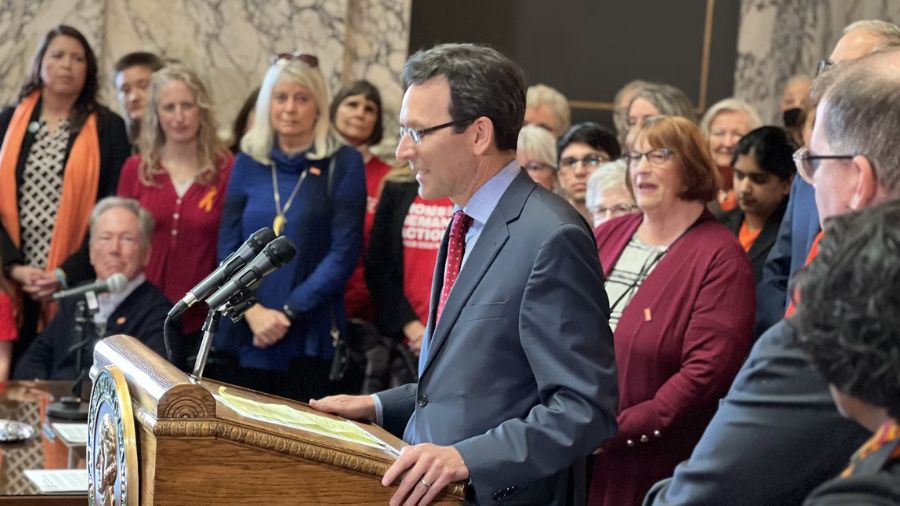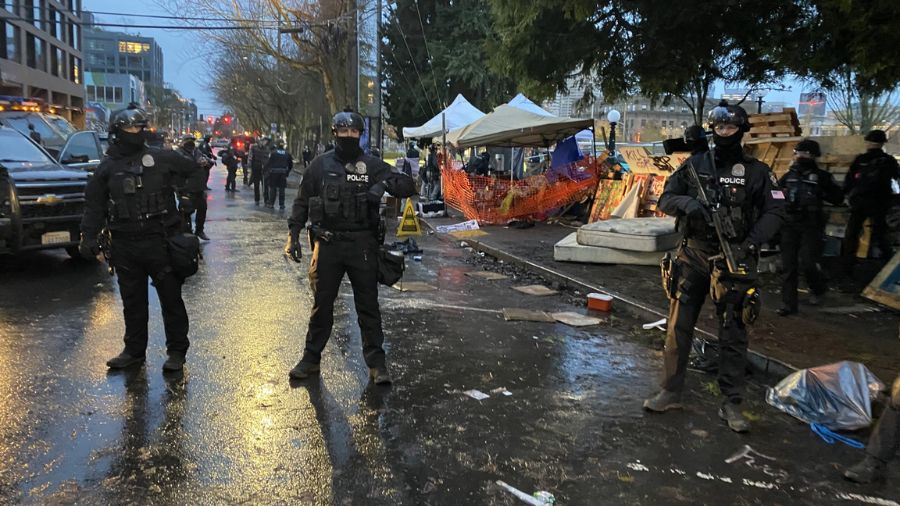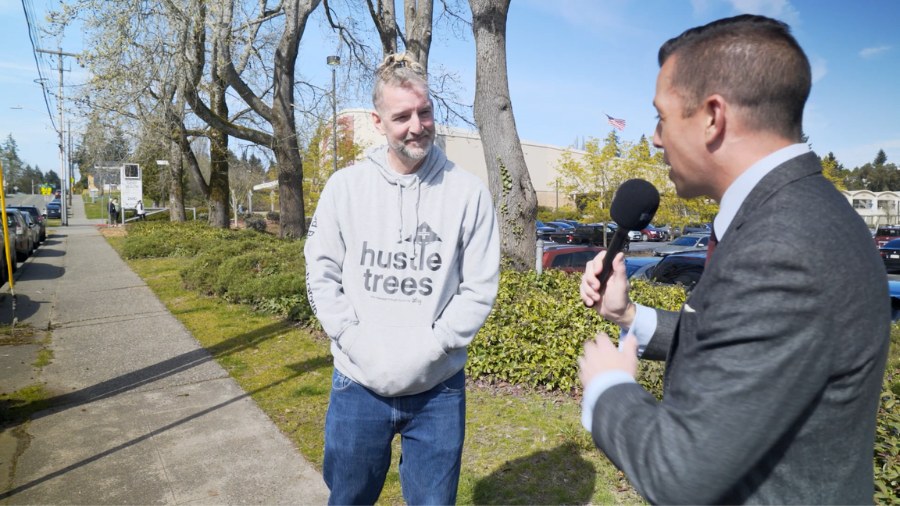Rantz: Seattle residents, business fight homelessness, upsetting activists and media
Aug 3, 2022, 6:22 PM | Updated: Aug 4, 2022, 9:22 am
Residents and business owners are taking back their streets from the homeless. They have placed one-ton concrete blocks around their neighborhoods and businesses in an effort to stop the homeless from moving back in and wreaking havoc.
The concrete blocks prevent broken-down RVs and tents from occupying the space. They’re being placed, mostly, anonymously. While Mayor Bruce Harrell has engaged in more targeted encampment sweeps, the action has been too slow and there are no consequences for the homeless who just move a block or two away — often with the help of activists. Many of the homeless bring crime, drug use, and garbage, making ugly concrete blocks the more appealing and safe option to Seattleites.
Some activists in and out of the media are upset. Let them be.
Rantz: Seattle activist invites homeless to her home, immediately regrets it
The crisis explained
Under Harrell and previous mayors, homeless encampment sweeps are generally inconvenient but ineffective for many homeless.
While there have been some obvious successes in bringing people into shelter, progressive activists help homeless set up new encampments after they’re swept. Harrell’s sweeps are coming too slowly. And police can’t leverage arrests to push homeless people into getting the help they desperately need.
Thus, there’s little incentive for the homeless person, oftentimes dealing with untreated addiction or mental health issues, to go into a shelter. They have progressive activists to enable their choices to stay on the streets.
But when an encampment is swept, residents and business owners want to make sure they don’t have to worry about the homeless returning. Hundreds of these eco-blocks have gone up around the city, as a result. While they’re eyesores, they provide some level of safety and comfort as it’s the kind of hostile architecture that pushes the homeless away. If they’re not willing to get the help the city and county offer, they’re no reason taxpayers have to suffer consequences.
The staff at The Seattle Times is not happy.
Seattle Times lobbies for homeless encampments
The Seattle Times reporter Amanda Zhou decried the “illegally placed” eco-blocks in an editorial masquerading as a news feature.
Zhou’s piece was framed around the woes of a homeless man upset that he can’t set up his broken-down RV wherever it is he wants. Though the homeless cannot live rent-free in broken-down RVs or disgusting tents wherever it is they want, the Seattle Times is more worried about the eco-blocks.
“It is illegal to place ecology blocks in public streets, sidewalks, or parking spaces,” Zhou notes. “Ecology blocks cause ‘parking spillover into adjacent streets, block utility access and cause other accessibility or transportation problems,’ according to the Seattle Department of Transportation.”
The reporter wants to know why citations aren’t being offered to those responsible for the concrete blocks. She shows no such interest in why homeless are allowed to own streets and sidewalks they don’t pay for, intimidating and harassing neighborhood residents and employees in the process. That illegal behavior is encouraged because it lets left-wing Seattle activists go online to fake interest in the lives of the homeless they refuse to help.
Eco-blocks are the result of desperation
“They’re human beings! Show them dignity!” the (usually) white progressive screeches when a sweep occurs, somehow thinking it’s compassionate to keep those human beings living in squalor, surrounded by used needles, trash, and human waste.
They think even less of tax-paying, law-abiding citizens who want to live safe lives with their families.
The eco-blocks wouldn’t go up if the Democrat leaders had a coherent strategy to tackle homelessness. Imagine how desperate one must feel in order to anonymously place the concrete barriers. It’s done because they know they have to protect their own communities; Democrats here won’t prioritize taxpayers over the homeless.
For all the years where a holistic plan was promised, all while sinking billions in efforts to solve homelessness, the region has little to show for it.
One reason nothing gets done is that the only solution Councilmembers and area activists will accept is a fully subsidized studio apartment on Capitol Hill for every homeless person. There will be no rules and no expectation to stop smoking fentanyl or seeking treatment for a mental health problem. In other words, constantly enabling the very behavior that caused the homelessness to begin with, only this time, we’ll take care of them until their inevitable overdose.
No more coddling
Want to get rid of the eco-blocks? Put teeth to a homelessness plan.
Sweeps only work when there are consequences. Programs that incentivize businesses to hire able-bodied homeless people can work. Expanding programs that help teach basic skills will make it easier for a business to hire a homeless person. I’ve lost interest in coddling otherwise healthy and able-bodied homeless men and women until they’re willing to get off the streets.
We can only offer them resources for so long before they make the choice to stay on the streets. We shouldn’t accept that choice.
Don’t like the shelter options provided? Too bad. They can be picky on their own dime. When they get a job and pay rent, they can arrange whatever legal living arrangements they want. If they don’t want to take us up on our generous offers, then they should go somewhere else. We are right to expect sidewalks, parks, alleyways, and everywhere else to be free from homeless people who don’t have underlying health reasons making them susceptible to homelessness.
A better way
If someone is mentally ill, we should put our resources into treatment over housing.
If they’re schizophrenic on the streets, they’ll fare barely better in a Capitol Hill studio apartment. They’re not homeless because they lack a home, but because of a medical issue that leads them to the streets. Compassion is to offer (and yes, even sometimes compel) treatment, not let them waste away on a sidewalk.
And for the homeless addicts? We enforce the law.
Some addicts need the criminal justice system to intervene. They’re paying for the drugs via theft. They should be treated like thieves if they’re unwilling to go into treatment that we should provide. Instead of buying up homeless hotels, we should put the money into addiction treatment. They can’t get back on the right path if they’re overcome by drugs or alcohol. Some can get treatment in facilities and others can sober up in jail if that’s what it takes.
Activists may think this approach is cruel. Who cares what they think? I’d rather be cruel if it means the homeless man or woman won’t die on the streets or hurt someone else.
They might think it’s naïve. Oh, okay. Some activists are well-intentioned; others are not. It doesn’t matter at this point. They’ve been in charge this whole time and they’ve made the problems worse.
They can complain about this approach in a lazy blog they’ve written 14 times before or in a tweet thread liked by those living comfortably in their echo chamber. Saving lives and cleaning up the city is more important than pleasing incompetent, partisan, ineffective dullards who couldn’t govern their way out of a paper bag or treat a headache, let alone a homelessness crisis.
But, until this happens, eco-blocks it is.
Listen to the Jason Rantz Show weekday afternoons from 3–6 pm on KTTH 770 AM (HD Radio 97.3 FM HD-Channel 3). Subscribe to the podcast here. Follow @JasonRantz on Twitter, Instagram, and Facebook. Check back frequently for more news and analysis.


















